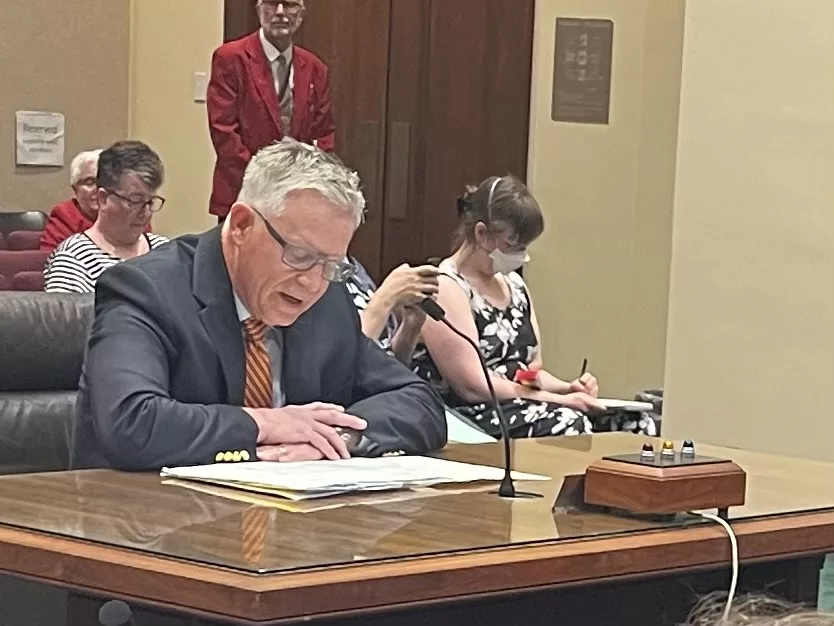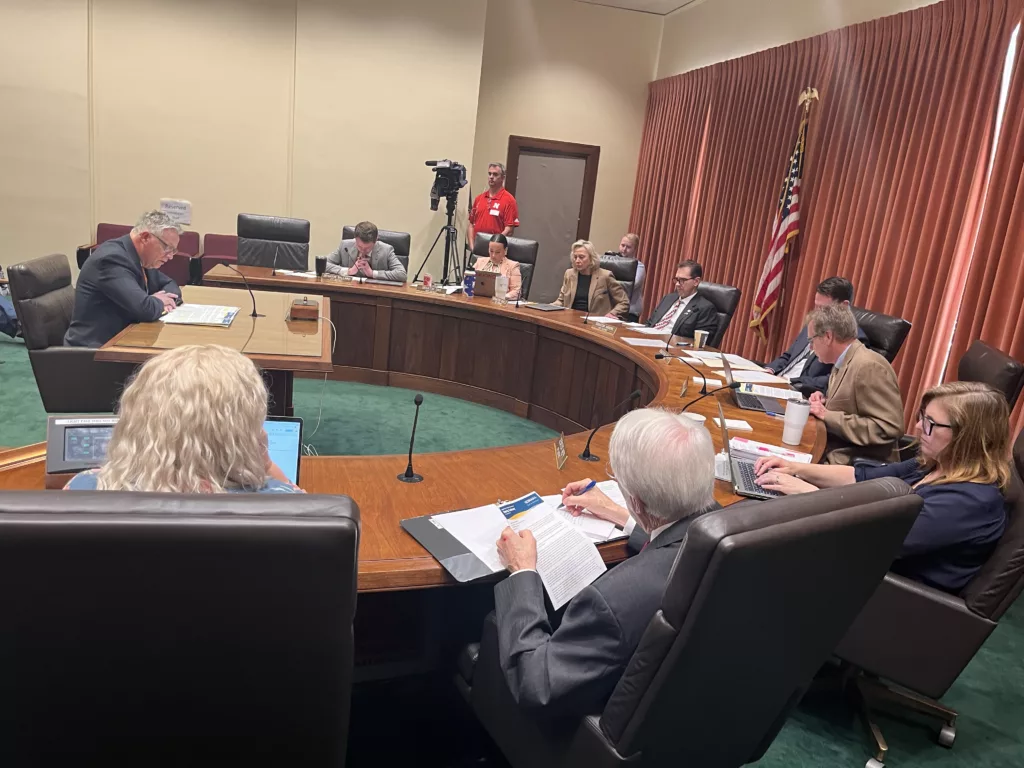When Nebraska lawmakers passed restrictions on gender-affirming medical care into law, they turned power to – and placed a spotlight on – Dr. Timothy Tesmer, a Lincoln ear, nose and throat doctor.
The new law bans gender-affirming surgeries for minors. It tasks Tesmer, the state’s new Chief Medical Officer, with making rules for puberty blockers that pause physical changes and hormone therapy that feminizes or masculinizes a person’s body.
Nebraska’s chief medical officer will make these rules – a setup that may be unprecedented in state history – even as the new law is challenged in court. It appears on uncertain ground after a federal court in Arkansas struck down a similar law banning gender-affirming care this week.
Tesmer, who previously chaired the state Board of Health, has a good reputation in the medical community, say doctors interviewed by the Flatwater Free Press. And he pledged at his confirmation hearing to set any personal biases aside and make the new rules with a team of experts.
But he’s also appointed by Gov. Jim Pillen, who has pledged to fight “the radical transgender agenda” and who recently invoked Satan when talking about children seeking gender-affirming care.
“We believe in protecting our kids, making sure that they – parents and kids – don’t get duped into the silliness that if you do this you’re going to become happy,” Pillen said after he signed the new restrictions into law. “That is absolutely Lucifer at its finest.”
Opponents have also raised alarms over Tesmer’s leadership on the state Board of Health, which supported a total ban on gender-affirming care – including banning puberty blockers and hormone therapy – earlier this year.
“How can the public trust Dr. Tesmer to provide proper accountability to the medical community and to … physicians if he’s going to allow politics to be put before process?” said Abbi Swatsworth, executive director of Out Nebraska, at Tesmer’s confirmation hearing.
The Nebraska Legislature approved Tesmer’s appointment on a 29-11 vote after a combative Health and Human Services Committee hearing and executive session.
“I get it. I know people are hurting,” Tesmer told senators at his confirmation hearing. “We want to do the right thing within the guidelines of the law that’s now been enacted.”

Opponents and some medical providers are training a watchful eye on what Tesmer does next.
That includes Sen. Machaela Cavanaugh, a Democrat from Omaha who led a months-long filibuster against efforts to restrict gender-affirming care.
She’s wary in part because she’s seen no gender-affirming care providers or families of trans youth included in the Pillen’s administration’s decision-making, she said.
“I have no reason to think that he’ll do anything other than what he said at the public hearing,” Cavanaugh said. “I’m just concerned about who he’s going to include.”
Tesmer, a Grand Island native, graduated from the University of Nebraska Medical Center in 1982 and worked as an ENT for over three decades, most recently in private practice in Lincoln.
He served on the state’s Board of Health starting in 2020, work that spurred his desire to “become a public servant,” he said.
The Chief Medical Officer, under state law, oversees the discipline of licensed professionals and facilities.
“Broadly speaking, individuals appointed to this position have not been required to have executive leadership, management, budget or public health expertise,” said Tom Safranek, who served as the state’s epidemiologist for three decades.
He called the position a “patronage-type job,” but said there have been exceptions.
The Nebraska Medical Association supported Tesmer’s appointment, writing that he “has demonstrated a willingness to listen and consider the concerns of all stakeholders and to make fair decisions based on his responsibility to the health and safety of Nebraskans.”
Medical providers interviewed also have a favorable impression of Tesmer.
“He fits the bill for what you need for a Chief Medical Officer,” said Dwight Jones, chair of the Department of Otolaryngology at the University of Nebraska Medical Center, who said he’s known Tesmer “peripherally” for all of his career.
Nurse practitioner Clara Fynbu Eggert, who said she’s occasionally worked with Tesmer while caring for patients in Lincoln, said she regarded him as “a collegial, very pleasant, very evidence-driven clinician.”
That’s why it surprised her, she said, when she saw a news story from the Nebraska Examiner detailing how Board of Health members worked with Sen. Kathleen Kauth, a Republican from Omaha, to get a statement supporting her Legislative Bill 574 into senators’ hands this March.
At the time, the bill was still a total ban for people under 19. It was part of a deluge of similar policies introduced in state legislatures across the U.S.
The board’s statement concluded that the board “does not support irreversible surgical and hormonal manipulation of minors for the purposes of gender reassignment.” According to meeting minutes, Tesmer tried and failed to remove that sentence from the statement. The board, including Tesmer, then approved the statement 11-0.
“The hardest thing about reading that letter is that I don’t believe that any of the people on the Board of Health are involved in gender-affirming care,” said Fynbu Eggert, who now works at pediatric and behavioral health clinics in Lincoln, including with clients who are gender non-conforming.
In records and at his confirmation hearing, Tesmer said he did not know about the topic of the bill or the statement until the day the board approved it.
He said he voted for the statement because he agreed that “irreversible treatment should not be done for minors,” which in his mind referred to surgeries. The effects of puberty blockers, he pointed out, are reversible – he did not mention hormone therapy, which is partially reversible and also now under his rulemaking purview.
Sen. Jen Day, a Democrat from Gretna, took issue with Tesmer’s responses about his role in the statement. Either he didn’t know what was going on, which she called “troubling,” or he did and lied to the committee, she said.

Sen. Ben Hansen, a Republican from Blair who chairs the Health and Human Services committee and brought the amendment that delegated rulemaking to the Chief Medical Officer, said he was happy with Tesmer’s hearing and that questions from opponents were legitimate and needed to be hashed out.
“He made explicitly clear that ‘It’s not just me who’s making decisions, I need to rely on other people who take care of… transgender children and other people to make the best decision that we can,’” he said. “So, I trust him.”
The path ahead is now uncertain for Tesmer, for the rules he must put in place and for minors and their families seeking gender-affirming care.
The issue is headed to court, after a recent lawsuit alleged the new law, which also tightens abortion restrictions, is unconstitutional because it violates Nebraska’s requirement that laws stick to one subject.
And, just this week, a federal judge in Arkansas issued a permanent injunction blocking the state’s ban on gender-affirming care for people under 18. The judge ruled it unconstitutional.
The Arkansas attorney general plans to appeal, and Arkansas is in the 8th circuit with Nebraska. The ruling strengthens the federal case against Nebraska’s similar law, said Sen. John Cavanaugh, a Democrat from Omaha and attorney.
“I think it makes it more certain that someone will bring a federal lawsuit and prevail,” he said.
If not impacted by a court decision, Nebraska’s gender-affirming care restrictions are set to go into effect Oct. 1 – though the chief medical officer has warned the new rules won’t be ready by then.
Under the new law, Tesmer is required to put into place rules and regulations regarding use of “nonsurgical gender-altering procedures,” like puberty blockers and hormone therapy.
These rules have to include specific standards listed in the bill, like the minimum number of hours of therapy focused on gender identity that a minor must go through before they can receive puberty blockers or cross-sex hormones.
But whatever Tesmer passes won’t necessarily be permanent, Hansen said, mentioning that a future appointee could pursue amendments.
While the Department of Health and Human Services is often tasked with creating rules and regulations, spokesperson Jeff Powell said it’s typically done via a state law that puts that responsibility with the department’s CEO and allows the CEO to delegate that process.
He didn’t respond directly when asked if the Legislature had ever before tasked the Chief Medical Officer with establishing rules and regulations.
Tesmer said he won’t do this alone. He said “every attempt will be made” to assemble legal experts and providers who specialize in family practice, pediatrics, adolescent medicine, endocrinology, hormone therapy, behavioral and mental health therapy.
“It will truly be a multidisciplinary team that will be providing those regulations, and they will be accomplished in a thorough, evidence-based fashion,” he said.
Following state law, that team will draft regulations, he said, then there will be a public hearing. They’ll revisit the draft to see if there needs to be any big changes, he said, and if substantial changes are made there will be another public hearing.
The regulations will eventually go to the Board of Health for its review in an open meeting, he said, then to the Attorney General’s Office for its review and approval and then to the governor for his review and signature.
This process means the rules will not be in place by Oct. 1, when the bill goes into effect, Tesmer said. He did not offer an expected timeline, and neither did a DHHS spokesperson.
“I understand there’s going to be a hiatus – a limbo land, here,” Tesmer said. “But we will do our very best effort to get something out.”
A tracker maintained by the Secretary of State’s Office shows that the length of time it takes to complete rules and regulations varies widely.
“There really is no typical range of time,” said Powell, the DHHS spokesperson. He did not answer whether Tesmer would pursue emergency rules to have something in place during that interim period.
Once Oct. 1 hits, Hansen said his legal counsel believes minors won’t be able to start receiving puberty blockers or hormone therapy until rules are in place. In his understanding, people already receiving care will be able to keep receiving it under the new law.
Flatwater Free Press asked Hansen other questions about what happens Oct. 1 – including whether those who continue care under the new law will be able to advance that care – but he deferred to the Attorney General’s Office. The AG’s Office also declined to comment.
“If he’s really going to build a coalition, I think he can do this job,” said Helen Grace, a pediatrician, in her neutral testimony at Tesmer’s hearing. “If he chooses not to build a coalition and he is in politics instead of medicine, then I don’t think he can do this job.”
Alex Dworak, associate medical director of family medicine at OneWorld Community Health Centers in Omaha, said that ideally Tesmer would, to the extent permitted by the new law, codify existing standards of care for transgender youth, “which we already use to ensure thoughtful, cautious and patient-centered care for our patients.”
Dworak provides gender-affirming care – including prescribing puberty blockers and overseeing hormone therapy – as part of his practice, he said.
Fynbu Eggert similarly said that she hopes Tesmer heeds those existing guidelines.
“I would really like to see that… we do it in a way that honors who these people really are,” Fynbu Eggert said. “Because they’ve told us. We need to just listen.”
Standards of care published by the World Professional Association for Transgender Health and the Endocrine Society – which the American Academy of Child and Adolescent Psychiatry call the “most widely known guidelines” for providers who serve youth with gender dysphoria – recommend against puberty blockers and hormone therapy for prepubescent children and set out specific recommendations for gender-affirming care after they hit puberty.
There’s a mistaken perception that doctors administer puberty blockers to young children, Fynbu Eggert said. This perception “is not aligned with reality,” she said.
“When the discussion to begin using medication to affirm their gender begins it is often not a sudden seismic shift but rather the natural progression of the discussions being had over the course of five to 10 years,” Fynbu Eggert said.
In at least one respect, Tesmer’s rules won’t look like those widely known guidelines: Standards from those organizations don’t include a minimum number of hours of psychotherapy for children or adolescents.
Tesmer’s rules also must include a “minimum waiting period” between when a doctor gets informed consent and when they prescribe the medication, which Dworak said isn’t part of current practice – “this isn’t a handgun,” he said.
“We take very thorough precautions in a way that we don’t with almost any other thing that we do in primary care,” Dworak said, detailing the multi-step process that occurs before he prescribes puberty blockers or cross-sex hormones.
Since LB 574 passed, Dworak said two trans adult patients he has treated left Nebraska because of the political climate. While these patients make up a “small fraction” of his practice, he said parents of the minors he treats have plans to leave, as do several other trans adults.
He described his current position on Tesmer as “trust but verify.” He was among the many doctors and healthcare groups who testified against the original LB 574. He testified as neutral on Tesmer’s appointment.
According to Dworak, the Department of Health and Human Services took down his name, along with pediatrician Helen Grace’s name, to form an “advisory board” of volunteers who provide gender-affirming care.
“[Tesmer] seems to have good ideas and to genuinely be committed to public health in Nebraska, but he participated in an active harm to the trans community and to us medical professionals who serve them,” while on the Board of Health, Dworak said. “He needs to account for that and do better before I would ask any of my patients or their families to trust him.”




1 Comment
Excellent article! Thanks for thorough reporting on this issue!